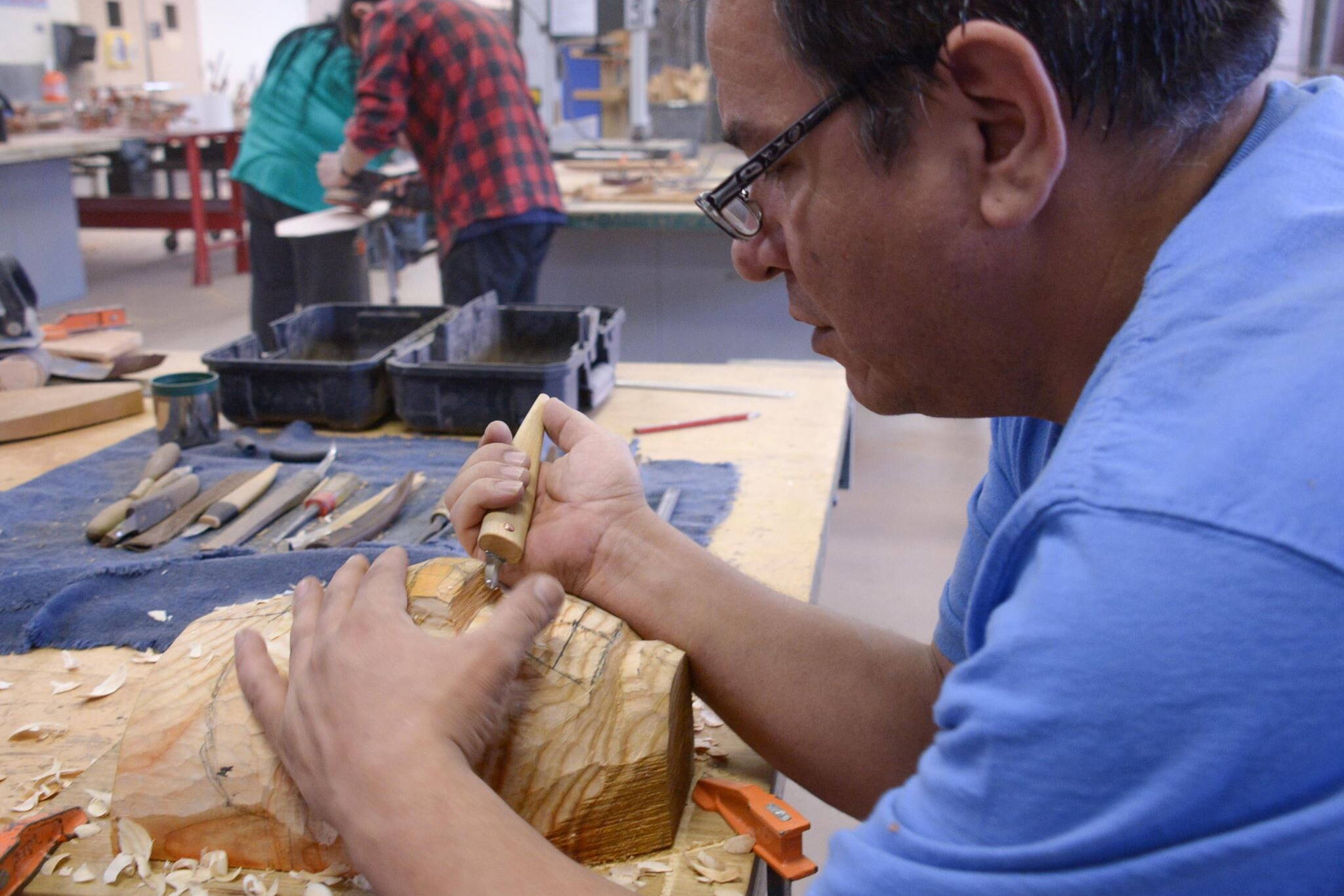Doug Chilton has spent a lifetime in Juneau crafting masterpieces ranging from canoes used for landmark heritage journeys to a totem pole with his son now exhibited at the top of the Goldbelt Tram. On this coming Sunday — Christmas Eve — he is closing his shop in Juneau for good as he and his wife prepare to move to Washington state to continue their work there.
The Tlingit artist’s work on one canoe was described as “A Myth in the Making” by Smithsonian Magazine in 2007. Chilton, 58, is also the founder of the One People Canoe Society that brings tribal members from throughout the region together for voyages to events such as Celebration, and near-annual trips between Alaska and Washington state.
Day-to-day he’s been operating Indigenous Art Doug Chilton Designs, which moved from the Mendenhall Mall to the historic former Alaska Steam Laundry building downtown on South Franklin Street in June. But in an interview Monday, Chilton said the scope of his projects has gotten too large for the space at his shop and other locations he uses in town.
“It’s not a decision that we’ve come to lightly,” he said. “We have been looking for quite a while now trying to find a location here that is large enough to fit our needs. And we just haven’t really had any luck. Anything that’s big enough it’s just way too expensive.”
Chilton was born in Juneau — the last of 13 kids — and lived here nearly his entire life, aside from a four-year period when he moved to Anchorage. He said he also spent most of his adult life working in the tourism industry, and saw enormous changes in that as well as perceptions of Alaska Native heritage during his years of activities in both endeavors.
Tourism’s growth means there’s fewer people interested in “big ticket” purchases as part of a “bucket list” trip, Chilton said. Many people are also immediately directed to tour buses when they disembark ships, then dropped off at corporate-owned stores near the docks with little time to shop afterward.
“They’re selling products similar to ours that are Native designed, but theirs are made in a foreign country,” he said. “And they’re able to buy them in huge bulk numbers and therefore offer them at a third of the price that we sell ours.”
Another difficulty is the downtown shop didn’t get the traffic hoped for despite a record number of cruise ship passengers in Juneau this year, Chilton said. He said much of that was due to people experiencing homelessness near the exterior of the store, which caused tourists to stray away.
“The people they didn’t stop. They went right around us,” he said.
The store is selling most of its inventory of items ranging from Christmas ornaments with Chilton’s artwork to paint-it-yourself miniature carved totem pole kits for half price until its scheduled closing at 5 p.m. Sunday. It is also holding daily giveaway drawings for items.
But while tourism has been a struggle a times, Chilton said he’s also got memories — and landmarks — on a grand scale, including the Eagle Thunderbird Totem he carved with his son, Michael, placed at the top of the tram in 2014.
“That was a lot of the father-son stuff that I did with him,” he said. “That’s what was a big deal for me.”
The canoe referenced by Smithsonian Magazine was commissioned for the new Ocean Hall that opened in 2008 at the National Museum of Natural History in Washington, D.C.
Chilton has also taken his One People Canoe Society on journeys beyond the waters of the Pacific Northwest, including joining the Standing Rock Sioux Tribe in 2016 to protest a controversial pipeline. He said those efforts are continuing to grow in scope.
“We’ve worked with the different (Alaska Native Claims Settlement Act) corporations over the years, and also with the tribal health organization SEARHC and also the Alaska Native Medical Center in Anchorage,” he said. “And through doing that we work with suicide prevention, we’ve worked with at-risk youth reentry programs that they had for sobriety and wellness, and then the traditional foods programs…that are harvested, the traditional hunting with the communities, it’s been an exciting growth.”
Many years have also been spent teaching everyone from youths to older individuals the ways and crafts of Tlingit culture, whether it’s making paddles or learning how to use them properly.
“When it started off it was one person dreaming,” Chilton said. “And by introducing other people to it, it kind of slowly stepped up along. Then first time we talked about doing a journey from one community to the other people thought we thought we were crazy — you know ‘don’t do that.’ Well, it’s not about getting there. It’s about how you get there.”
“So we got to do some of the journeys in our canoes where we traveled the old routes our ancestors used to travel. So through doing that we were able to bring some of those at-risk people with subsistence prevention type stuff, to try to keep them away from the drugs and alcohol, and bringing them along to the traditional sites and the traditional areas that have been there forever.”
Chilton said he and his wife, Misty, are planning to move to the Olympia vicinity of Washington where they will continue offering his artwork online — which has been most of their business lately — but he also plans to return to a liveaboard boat they have in Juneau during summers for canoe voyages and other events. Among those will be a “two-way” canoe voyage in 2027, where groups departing from both Alaska and Washington will meet up in Saxman.
“We’re not going to leave and just not come back,” he said.
• Contact Mark Sabbatini at mark.sabbatini@juneauempire.com or (907) 957-2306.

